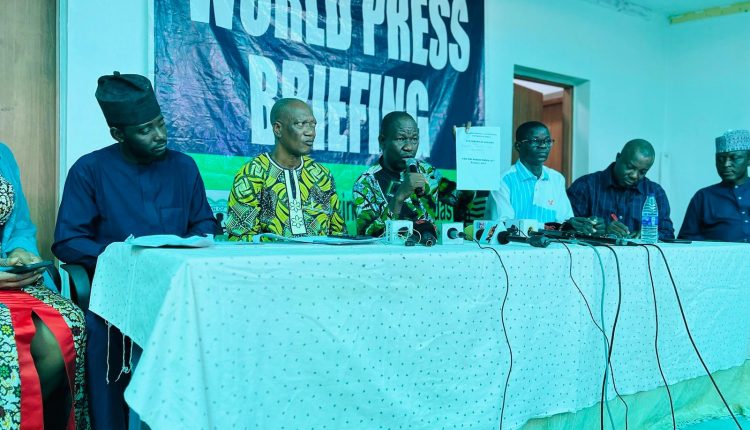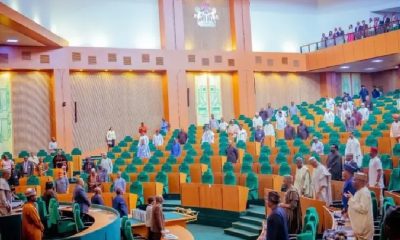News
ITU Ranks Nigeria High in Digital Transformation Readiness

A new report of the International Telecommunication Union (ITU), has ranked Nigeria very high at 71 per cent, in comparative legal, policy and governance frameworks towards G5 – advanced state of readiness for digital transformation known as G5 with Germany, Finland and Singapore leading the global chart.
In the report conducted by the ITU, the United Kingdom’s Foreign, Commonwealth & Development Office (FCDO) and the Nigerian Communications Commission (NCC), and unveiled by Nigeria’s Minister of Communications, Innovation and Digital Economy, Dr. Bosun Tijani in Abuja on Monday, Nigeria was ranked among Africa’s top seven BEMECS 5G Readiness Index, which represents the country’s readiness to deploy and adopt mass-market 5G networks.
Titled, Collaborative Regulation: Accelerating Nigeria’s Digital Transformation, and presented at the Digital Economy Complex, Mbora, Abuja by ITU’s Kagwira Nkonge, the report, among other things, presented a case study for ‘collaborative regulation review to assess and support Nigeria’s transition towards collaborative digital governance, evidence-based policy making and agile regulation in the digital economy”.
The report, which was presented to a cross section of key industry stakeholders including service providers, government agencies, representatives of multilateral institutions, West Africa Telecommunications Regulators Assembly (WATRA), Africa Telecommunications Union (ATU), among others, was also designed to complement existing cross-country benchmarks in which features of countries policy and regulatory environment are assessed.
The features of countries policy and regulatory environment are assessed according to the pillars of the Generations of Regulation frameworks which tracks telecom regulatory maturity towards digital transformation readiness, designated at G5 Advanced State of Readiness”, and for which Nigeria currently stands at G4.
Advanced State of Readiness is benchmarked against four critical levels of accomplishments which include national collaborative governance, policy design principles, digital development toolbox, digital economic policy agenda, with Nigeria scoring 91 per cent in regulatory capacity; 82 per cent in Market Rules; 81 per cent in Collaborative Governance; 76 per cent in Legal Instruments for ICT/Telecom markets; 69 per cent in National Digital Agenda Policy, among other benchmarks.
Dr. Tijani, in his remarks at the event, commended the ITU and partner agencies and consultants that actualised the report; and expressed Federal Government’s commitment “to utilise this report as a navigational aid towards attainment of our regulatory objectives and policies outlines towards achieving a robust digital economy”.
“That is what we will continue to do as a government, ensuring that we can put ourselves in a place to have cutting-edge modern regulations in place to ensure that business is done properly in our sector and to ensure that, where possible, increase the local content of the sector as well,” he said.
Dr. Tijani noted that NCC has adapted over the years in response to how its role and mandate have changed. He explained, “Fifteen, twenty years ago, NCC was just regulating the telecommunications sector, today, NCC regulates the foundation for which any economy would be prosperous.”
The Executive Vice Chairman of the NCC, Dr. Aminu Maida, who hosted the presentation, welcomed the indicators that promote effective regulation, attraction of greater investment, and development of innovative models for broader digital inclusion.
He emphasised that collaborative regulation would support Nigeria’s transition towards effective digital governance, evidence-based policy making and agile regulation in the nation’s digital economy.
News
Just in: Alleged Herdsmen Armed With AK-47 Rifles Take Over Communities In Benue State

Gunmen suspected to be Fulani herdsmen are currently invading some communities in the Ukum Local Government Area of Benue State.
According to sources, the herdsmen armed with AK-47 rifles stormed the community around 04:15pm on Thursday.
“Our lives are in danger this evening, armed Fulani herdsmen, about 600 in numbers have taken over our communities this evening,” a resident told SaharaReporters.
“They’re currently moving around towns in Ukum Local Government Area of Benue state. No security personnel at all, Governor Alia didn’t send security, they said operation will start soon once they (herders) have observed the place.”
The insecurity situation in Benue has been alarming in recent weeks with attacks from gunmen suspected to be herdsmen.
The media had reported that suspected herdsmen again unleashed terror in Benue State, attacking three communities in Otukpo Local Government Area (LGA) on Wednesday, just a day after 11 people were killed in a deadly raid on Otobi community.
The latest victims of the escalating violence were Emichi, Odudaje, and Okpamaju, communities that had previously suffered an attack in February, which left five people dead.
However, the renewed attack has created fear and mass displacement among residents, with women and children fleeing to safety.
Local sources say the death toll from the fresh attack remains unclear, but several casualties are feared.
News
SEYI Tinubu Speaks On Alleged Abduction, Brutalization Of NANS President Atiku Abubakar Isah

A group known as “Friends of Seyi Tinubu (FOST) has reacted to the alleged abduction and brutalization of Abubakar Atiku Isah in Abuja on Tuesday by Seyi Tinubu.
The group said never at any point has Seyi Tinubu ordered thugs to abduct and brutalise one Comrade Atiku Abubakar Isah, who claims to be President of the National Association of Nigerian Students (NANS).
The group described allegations against Seyi Tinubu as reckless, saying it’s an attempt to tarnish the good reputation of the President’s son.
A statement by the President of the group, Com. Adejorin Tai Manuel, condemned the publication dated April 16, 2025, alleging Seyi Tinubu was behind the attack on Atiku.
The statement reads:
“Mr. Seyi Tinubu is a young, focused, and accomplished individual who has no time, business, or interest in the politics of NANS, let alone stooping so low as to orchestrate violence against someone who is clearly unknown to him.
“The claim that Seyi Tinubu even recognises or acknowledges Comrade Atiku as a threat or enemy is laughable and clearly fabricated. Seyi Tinubu is not a member of NANS, not a patron, nor is he involved in any student political process. He remains committed to his personal and national development engagements, which are far beyond the narrow scope of campus politics.
“It is important to clarify that Comrade Atiku Abubakar Isah does not represent Nigerian students. His claims of being elected at the so-called “125th NANS Convention” are factually incorrect and devoid of logic. NANS, which was founded in 1980, has not held up to 125 conventions in its history. Atiku did not attend the last constitutionally recognized NANS convention, nor did he participate in any legitimate electoral process.
“There is no record of any election conducted that produced him. He has no known executive council, no vice president, no secretary-general, no financial secretary, or any EXCO member to support his claims. He merely woke up, declared himself president, and began parading the title across media platforms without mandate or legitimacy.
“One wonders who Atiku represents, where his mandate originated from, and how the medium failed to ask the most basic questions about his legitimacy before giving him a platform to spread lies.
“The so-called “election” that produced him remains invisible, with no evidence of senator participation or institutional backing. He has been rejected by the mainstream NANS community, and the public deserves to know that the association operates with structure and order not propaganda.
“Dragging the name of Seyi Tinubu into this charade is a calculated smear campaign designed to attract public sympathy and give credibility to a failed quest for recognition.
“But Nigerians are wiser than that. Seyi Tinubu has no business with impostors. His focus remains on uplifting youth, driving entrepreneurship, and contributing meaningfully to the nation’s development—not getting entangled in student leadership dramas. It is therefore absurd and insulting that a man of his pedigree would be linked to such crude behavior.”
News
NUJ-FCT Unmasks Financial Scandal Under Ex-Leadership, Issues Disclaimer

…handover Ogbeche, Osadebamwen, others to EFCC for probe
Speaking during a media interaction in Abuja, the Council under the leadership of Comrade Grace Ike shared details of the inquiry conducted by a committee established by the NUJ Congress. The initiative is part of ongoing efforts to enhance organisational accountability and strengthen internal governance systems.
The five-man panel, chaired by veteran journalist, Comrade Tony Akowe, included Comrade Ndubueze Chidoka (Secretary), Comrade Akin Orimolade, Comrade Princess Ekwi Ajide, and Comrade Imam Umar.
The committee’s scope covered activities from December 2018 to October 2021, encompassing the periods of past administrations led by Emmanuel Ogbeche and Patrick Osadebamwen.
According to the committee’s documentation, critical gaps were observed in record-keeping and transitional documentation. In addition, there was limited engagement from some former officeholders during the review process. The only available financial review for the period in question reportedly presented inconsistencies requiring further attention.
The committee noted that its work was hampered by a lack of cooperation from key figures of the past administration. According to Mr Akowe, no formal handover was done, and only a limited set of documents including one audited financial report and some rental receipts was made available.
Efforts to retrieve further documentation from the former chairman, Mr Patrick Osadebamwen, proved unsuccessful. He reportedly claimed to have submitted relevant documents to the NUJ National Secretariat, which has since denied receiving any such records.
The probe uncovered several questionable financial entries and unverified expenditures:
• A total of ₦33 million was declared as rental income between 2018 and 2021, but there was no breakdown showing the names of tenants or corresponding rent periods.
• The administration claimed to have received ₦7.2 million in donations yet failed to provide details or evidence of the sources.
• ₦5.28 million was spent on salaries for four to five staff, even though no single staff member earned more than ₦25,000 monthly.
• Over ₦1.7 million was reportedly spent on electricity, ₦285,000 on DStv/GOtv subscriptions, ₦78,000 on “public relations and entertainment”, and ₦1 million on transport and accommodation—all lacking adequate justification.
• A controversial line item showed ₦14 million received as rent “in advance”, with no associated documentation to validate it.
The committee’s report concluded that there was no transparency in the management of the union’s finances during the period under review.
Following the probe report, the NUJ-FCT Congress, in its sitting on 12 April 2025, adopted a series of resolutions aimed at protecting the Union’s integrity and financial stability.
The Council issued a public disclaimer against the following individuals, who have been warned to cease parading themselves as representatives of the NUJ-FCT Council:
• Mr Emmanuel Ogbeche, currently Special Adviser to the Governor of Cross River State.
• Mr Patrick Osadebamwen, immediate past Chairman and journalist with the Nigerian Tribune.
• Mr Ochiaka Ugwu, former Secretary of the Council and staff of People’s Daily.
In addition, Mrs Gloria Essien has been cautioned against representing the Council at the Nigeria Labour Congress (NLC), as she no longer holds any official position within the NUJ-FCT.
The union also called on UBA Bank to freeze the NUJ-FCT Council’s accounts still under the control of former signatories (Account Nos: 1022765326, 1014057659, and Dollar Account: 3002941904), pending a full transition to the current leadership.
Furthermore, the NUJ-FCT will:
• Publish a formal disclaimer in national dailies.
• Notify the employers of the former officials about the resolutions.
• Alert government institutions, corporate bodies, and the general public not to engage with the aforementioned individuals on behalf of the NUJ-FCT Council.
The Council’s Secretary, Mr Jide Oyekunle, who anchored the press briefing, reiterated that the probe’s findings and the resolutions reflect the collective will of the NUJ-FCT Congress and the determination to protect members’ interests.
-

 News6 hours ago
News6 hours agoBREAKING: Unknown gunmen reportedly storm Senator Natasha’s family residence
-

 News14 hours ago
News14 hours ago“How my father escaped assassination” – Bishop Oyedepo’s daughter
-

 News14 hours ago
News14 hours agoFG expresses sympathy for CBEX victims, urges a united effort to combat Ponzi schemes
-

 News8 hours ago
News8 hours agoSnub story on removal of Rivers Sole Administrator, it’s FAKE-Chief Registrar
-

 News8 hours ago
News8 hours agoSAD! Again, Alleged Herdsmen Attack Three Benue Communities
-

 News20 hours ago
News20 hours agoEl-Rufai labels Tinubu’s government ‘worst in Nigeria’s history’
-

 News15 hours ago
News15 hours agoWoman tragically lost her life after attempting to flee through glass door during alleged incident of domestic violence
-

 Politics8 hours ago
Politics8 hours agoPDP govs are jokers, can’t stop coalition train, Atiku boasts

















